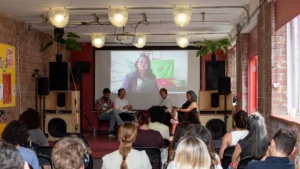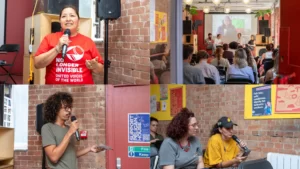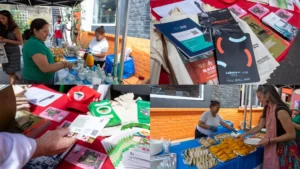Right to decent work
Labora puts agrarian reform and agroecology on the climate agenda in London
Panel held during London Climate Action Week brings together rural workers and researchers to debate just transition

By Sara Baptista
From Fundo Brasil
A just energy transition must place rural workers and local communities at the center of debates and decision-making. This was the central message of the panel “Land, Labor, and Climate: Agroecology and Agrarian Reform for a Just Transition,” held last Friday (27th) in London, United Kingdom.
The event was promoted by the Labora – Fund for Decent Work as part of the London Climate Action Week. Labora is an initiative of the Brazil Human Rights Fund that aims to strengthen workers’ organizations – especially those in more precarious conditions – in the fight for decent work, social protection, and a just transition.
The panel was moderated by Ana Valéria Araújo, executive director of the Brazil Human Rights Fund. Participants included Camilo Augusto Santana, from the national coordination of the Landless Workers’ Movement (MST); Oliver Gordon, writer and researcher at JUST Stories – a global storytelling project from the Institute for Human Rights and Business (IHRB) focused on Just Transition; Nick Robins, Chair of the Just Transition Finance Lab at the London School of Economics and Political Science (LSE); and, joining via videoconference, María Leonor Yonda, Vice President of the National Agrarian Coordinator (CNA) of Colombia.
In addition to the essential conversation, the event also offered snacks to the in-person audience at the headquarters of the United Voices of the World Union in London — all prepared with ingredients from agrarian reform initiatives, brought directly from Brazil in participants’ luggage. There was also a photo exhibition featuring images taken by photographers from Brazilian social movements in rural areas, river communities, and forests — all part of the Brazil Human Rights Fund’s collection.
In their remarks, the two rural workers’ leaders were unequivocal: there can be no just transition without agrarian reform and land democratization. Camilo Santana, from the MST, brought the Brazilian perspective by stating that “one of the fundamental points is recognizing the role that populations play in protecting and caring for nature, especially those from rural areas.”
“There’s no way to move forward on solving environmental issues without advancing agrarian reform,” said Camilo. “This agrarian reform policy should be thought of in a broad sense, with agroecology at the center and the work of local peoples as a foundation,” he added.
Leonor Yonda brought the Colombian point of view, which she said is similar to Brazil’s: “In Colombia, there have been agrarian reforms, but they were neoliberal in nature and didn’t generate policies for rural communities. So we say that to move forward, the true democratization of land is needed.”
Leonor also stressed the importance of occupying decision-making spaces: “Labor, pension, health, and education reforms have always been dominated by those who allow nothing for the working class. For us, participation of rural communities in politics is essential,” she added.

María Leonor Yonda (videoconference), Camilo Augusto Santana, Nick Robins, Nick Robins and Ana Valéria Araújo at London Climate Action Week. Photo: Diego Silveira/Brazil Human Rights Fund’s Collection
The activists’ speeches resonated with Nick Robins’ final comments, in which he warned that “there’s a risk that the concept of a just transition could be hijacked and emptied of meaning.” Nick noted that the discussion helped clarify that it is through local action and grassroots movements that the transition gains meaning.
Drawing from his experiences listening to communities affected by the climate crisis, Oliver Gordon reinforced the message: “What’s key is giving these communities a voice in how the transition is designed. At the end of the day, the people who will decide whether the transition is just or not are the communities.”
Perspectives for COP 30
With COP 30 approaching this November in Belém, the conference also came up during the debate, along with reflections on what key topics should be brought to the forum and how to ensure that affected populations are heard. Camilo emphasized that agrarian reform grounded in agroecology must go hand in hand with the energy transition in discussions and proposals.
For Nick Robins, “COP 30 is an opportunity to fill the just transition with meaning again, by listening to grassroots social movements.” On the other hand, Oliver Gordon argued that more than relying on large multilateral decision-making spaces, it is essential for common people to pressure for a truly just transition.
Leonor emphasized that sustainable production and development models are non-negotiable. “For us, arriving at COP means there must be a commitment to these policies. How can we articulate all this to ensure the planet can continue to resist?” she asked. “The solution is not in the money, it’s in our ways of life.”
Ana Valéria Araújo, executive director of the Brazil Human Rights Fund, also shared the role of the foundation in the debate and in actions related to a just transition. “We invest in mobilization,” she said, explaining that they’ve been funding the participation of social movements, Indigenous peoples, and quilombola communities in preparatory processes. “Because it’s in these preparatory stages that you can, in some way, influence what happens in official forums.”
She also highlighted the People’s Summit – which will take place alongside COP in Belém and will have high visibility – and is primarily composed of social movements. “And that makes a difference. Funds like ours are working to ensure that we can give voice to social movements and, with that, prevent the agenda from being co-opted.”
Financing a just energy transition
The central debate on climate financing was also a key part of the panel. Oliver Gordon shared the case of women working in salt extraction in Gujarat, India, and the partnership developed with Sewa UK and the International Finance Corporation (IFC). There, a model was created based on vendor financing, capital subsidies, and low-cost loans, which has proven successful economically, socially, and environmentally.
“It’s been very transformative for them as a community. But also, [this model] is incredibly scalable. It’s a model that works in other settings as well,” the journalist noted.
Professor Nick Robins spoke about the various sources of financing, including commercial banks, development banks, pension funds, and community funds. “We can talk about all these types of financing, but how do they come together? You don’t need one type of financing, you need many,” he explained.
Drawing from her philanthropic experience, Ana Valéria Araújo stated that it’s necessary to think about how to further democratize access to climate finance. In that sense, the experience of philanthropy – especially independent philanthropy from the Global South – is fundamental to moving actions forward in the region. “We know philanthropy is very effective at getting resources to communities. It’s a key partner for major financing mechanisms, to make them truly effective.”
London Climate Action Week brought together around 45,000 people from various countries in over 700 in-person and online events, held between June 21 and 29.

Photos: Diego Silveira/Brazil Human Rights Fund’s Collection

Photos: Diego Silveira/Brazil Human Rights Fund’s Collection

Photos: Diego Silveira/Brazil Human Rights Fund’s Collection



